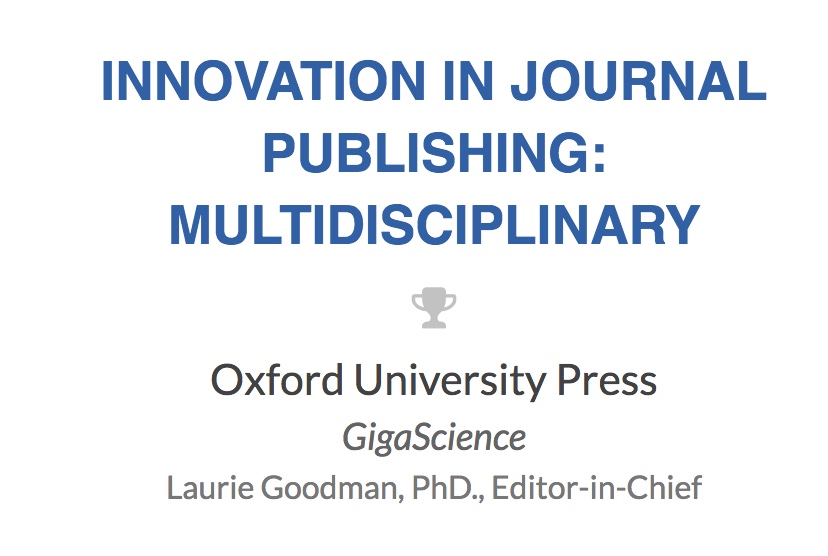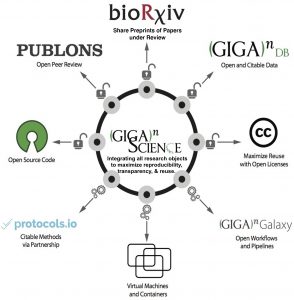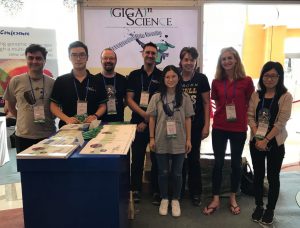GigaScience Wins 2018 PROSE Award for Innovation in Publishing
 We at GigaScience are pleased to have won the 2018 the PROSE Award for Innovation in Journal Publishing in the multidisciplinary category, as innovation has been a key element in our goal to change how scientific publishing is done. The Association of American Publishers (AAP) has been giving awards for 42 years to recognize distinguished professional and scholarly books, reference works, journals. Originally focused on professional and scholarly print material, in recent years, the awards have expanded to include electronic content, and the innovation in scholarly publishing category is another new addition. for the digital era.
We at GigaScience are pleased to have won the 2018 the PROSE Award for Innovation in Journal Publishing in the multidisciplinary category, as innovation has been a key element in our goal to change how scientific publishing is done. The Association of American Publishers (AAP) has been giving awards for 42 years to recognize distinguished professional and scholarly books, reference works, journals. Originally focused on professional and scholarly print material, in recent years, the awards have expanded to include electronic content, and the innovation in scholarly publishing category is another new addition. for the digital era.
In applying for this award, it gave us the opportunity to consider the variety of things we have worked on since our launch and present to our ongoing effort to take full advantage of the latest digital technologies in order to push scientific publishing beyond the stagnant PDF of a published article. To do this we have developed or used available platforms to make all components of the research process available to the reader. Instead of focusing on subjective impact, we have set goals to make scientific publishing more reproducible, transparent, discoverable, and reusable.
 The main characteristic of a GigaScience article is that it goes beyond the narrative to include all the ‘research objects’ associated with the research: data, software, source code, workflows, containers, virtual machines, and more. Since our launch 6 years ago, we’ve created a publishing workflow that connects articles to an in-house database, GigaDB, which hosts all the data associated with the research described in the article: something unique to most other journals. Importantly, given limitations in the availability of publicly available databases that can host a variety of data of exceedingly large size, GigaDB hosts data of any format, in interactive forms, and without size restrictions, including some that are terabytes in size. We also highlighted that we built GigaDB with the goal of making the data itself a published, persistent, citable object, by giving datasets a Digital Object Identifier (DOI). More, we noted that having a citable DOI allows the data and other research objects —unlike a stagnant PDF narrative— to be versioned and modified, with DOIs connecting each.
The main characteristic of a GigaScience article is that it goes beyond the narrative to include all the ‘research objects’ associated with the research: data, software, source code, workflows, containers, virtual machines, and more. Since our launch 6 years ago, we’ve created a publishing workflow that connects articles to an in-house database, GigaDB, which hosts all the data associated with the research described in the article: something unique to most other journals. Importantly, given limitations in the availability of publicly available databases that can host a variety of data of exceedingly large size, GigaDB hosts data of any format, in interactive forms, and without size restrictions, including some that are terabytes in size. We also highlighted that we built GigaDB with the goal of making the data itself a published, persistent, citable object, by giving datasets a Digital Object Identifier (DOI). More, we noted that having a citable DOI allows the data and other research objects —unlike a stagnant PDF narrative— to be versioned and modified, with DOIs connecting each.
Since our launch nearly 6 years ago, we have continued to develop our platform, or have integrated the latest open platforms, such as Protocols.io and Code Ocean, into our system to publish a steadily increasing number of research objects. Another ‘object’, that is not part of the research process, but that we also include with our articles is the content of all the peer reviews. We require that our reviews be open and include the reviewer names, and that these are made available with the publication of the paper. While peer-reviews are not a part of the research itself, they are a scholarly addition to the publishing process should be included as part of the record of the publication, providing both transparency and additional reference concerning the content of the article. And by giving the reports DOIs allowing the reviewers to also get credit for their hard work.

The GigaScience team (as many as we could find in one place)
Since the beginning, our push toward transparency carries with it a requirement for authors to go beyond the narrative and make all of their supporting research openly available. We noted to the awards committee that, even with our multiple hosting platforms, having authors do this is a tremendous burden: they are already overwhelmed with just their day-to-day (and often night-to-night). Given this, the journal not only includes the standard editorial team, but we have added biocurators, data editors, data scientists, and developers who aid the authors in organizing and sharing their research. And this award acknowledges and credits the hard work and efforts of all of the team.
While the team are quite proud to have been recognized with the PROSE Award for Innovation, we continue to look to the future to identify means to adapt, include, and embrace new technologies to achieve an open, dynamic, real-time publishing process.